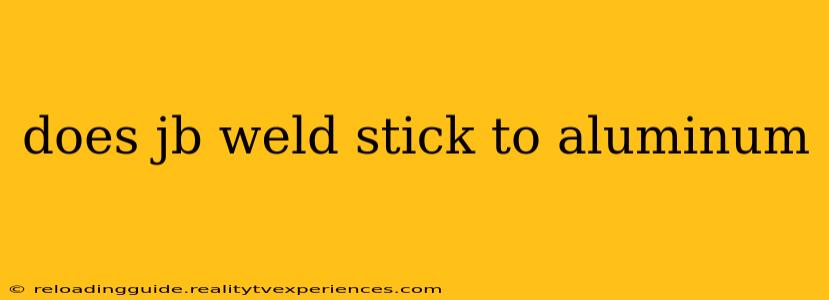JB Weld is a popular epoxy putty known for its incredible strength and versatility. But does it reliably adhere to aluminum, a material often used in demanding applications? The short answer is: yes, but with important considerations. This guide delves into the specifics of using JB Weld on aluminum, covering preparation, application techniques, and factors affecting its performance.
Understanding JB Weld and Aluminum Adhesion
JB Weld's effectiveness on aluminum hinges on proper surface preparation. Aluminum's naturally occurring oxide layer can hinder adhesion. This oxide layer acts as a barrier, preventing the epoxy from forming a strong bond with the underlying aluminum. Therefore, meticulous cleaning and preparation are crucial for achieving a successful, long-lasting repair.
Factors Affecting JB Weld's Performance on Aluminum
Several factors influence how well JB Weld adheres to aluminum:
- Surface Cleanliness: This is paramount. Grease, oil, dirt, paint, and even fingerprints can significantly weaken the bond. Thorough cleaning is essential.
- Surface Roughness: A slightly roughened surface provides more mechanical "grip" for the epoxy to adhere to. A smooth, polished surface offers less surface area for bonding.
- Type of Aluminum: Different aluminum alloys have varying surface properties, which can affect adhesion. However, JB Weld generally performs well on most common aluminum alloys.
- Environmental Conditions: Temperature and humidity during application and curing can influence the final bond strength. Following the manufacturer's instructions regarding temperature and curing time is vital.
- JB Weld Formulation: While the standard JB Weld is effective, specialized formulations like JB Weld 8000 might offer improved performance on certain aluminum surfaces or applications demanding higher heat resistance.
Preparing Aluminum for JB Weld Application
To maximize adhesion, follow these steps:
-
Thorough Cleaning: Use a suitable solvent like acetone or denatured alcohol to thoroughly clean the aluminum surface. Remove all traces of grease, oil, dirt, or any other contaminants. A wire brush or Scotch-Brite pad can help remove stubborn residue. Allow the surface to dry completely before proceeding.
-
Surface Roughening (Optional): For optimal adhesion, consider lightly roughening the aluminum surface using fine-grit sandpaper (around 220-grit) or a Scotch-Brite pad. This increases the surface area for the epoxy to bond with. Be careful not to excessively scratch the aluminum.
-
De-oxidation (Optional, but Recommended): For critical applications, consider using a chemical de-oxidizer specifically designed for aluminum. This removes the surface oxide layer, improving adhesion significantly. Follow the de-oxidizer manufacturer's instructions carefully.
Applying JB Weld to Aluminum
-
Mixing: Follow the manufacturer's instructions for mixing the two components of JB Weld thoroughly. Ensure a consistent color and texture are achieved.
-
Application: Apply a generous amount of JB Weld to the prepared aluminum surfaces, ensuring complete coverage of the bonding area.
-
Clamping (If Necessary): If possible, clamp the parts together firmly to maintain consistent pressure during the curing process. This helps to prevent shifting and ensures a strong, even bond.
-
Curing: Allow the JB Weld to cure completely according to the manufacturer's instructions. This usually takes several hours, but achieving full strength may require 24 hours or more.
Conclusion: Achieving Success with JB Weld and Aluminum
While JB Weld adheres well to aluminum, achieving a durable, reliable bond depends on proper surface preparation and careful application. By meticulously cleaning, optionally roughening the surface, and following the manufacturer's instructions, you can significantly improve the likelihood of a successful repair. Remember to consider using a de-oxidizer for critical applications where superior adhesion is paramount. For projects requiring extreme heat resistance or other specialized properties, explore other JB Weld formulations designed for such demands.

